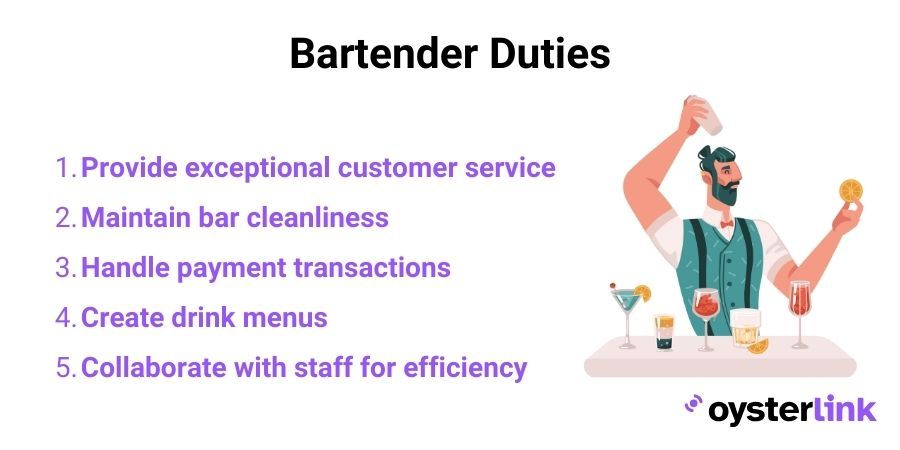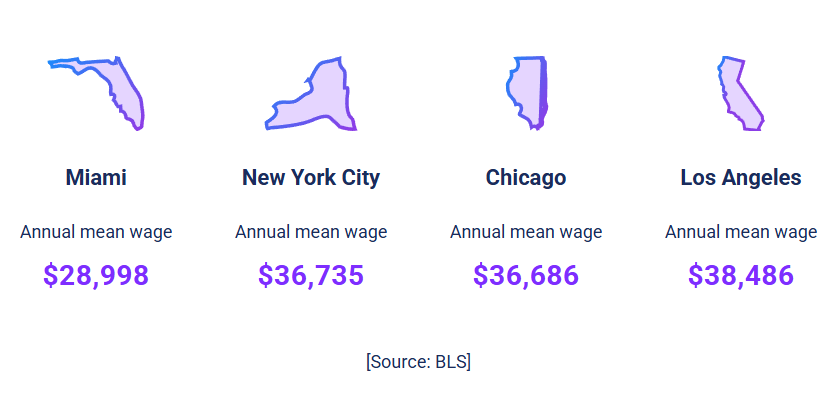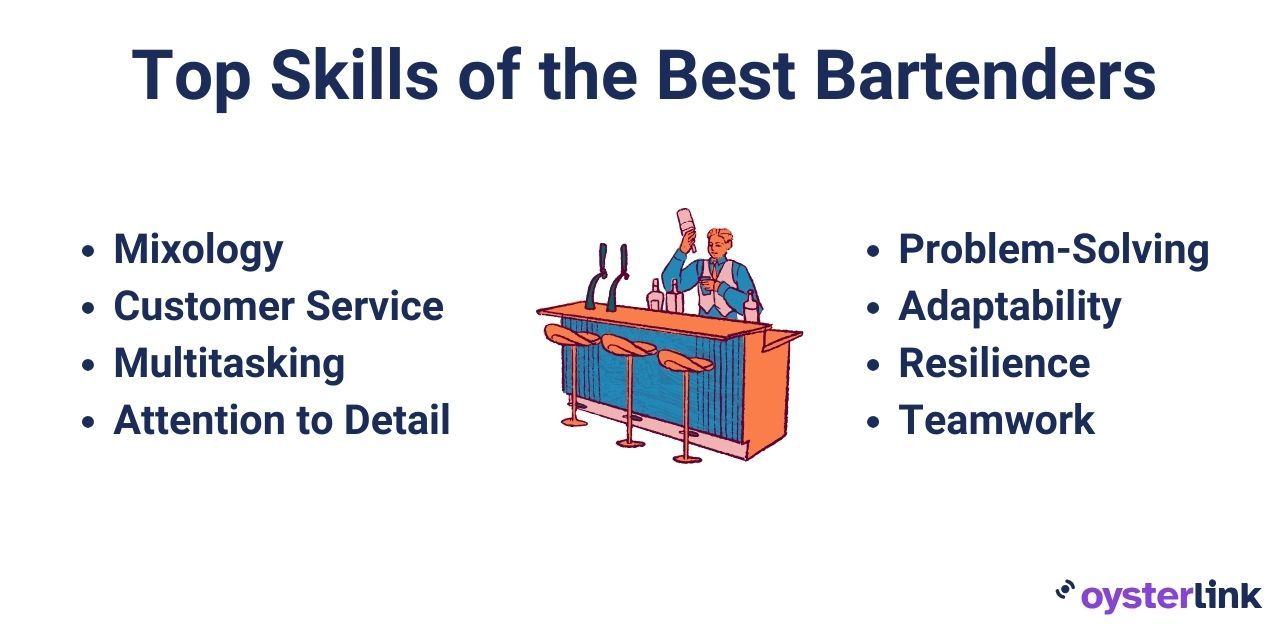Bartender Career – 2026 Complete Guide on Duties & Salaries
This overview provides valuable insights into the Bartender's role. We cover the responsibilities, salary, career progression and frequently asked questions.
What Is a Bartender?
A Bartender is a skilled professional in the hospitality industry responsible for preparing and serving beverages.
With a strong understanding of mixology, they skillfully combine and balance different spirits, liqueurs and mixers to create an extensive menu of alcoholic and non-alcoholic beverages.
What Does a Bartender Do?
A Bartender’s day-to-day responsibilities include:
- Mixing a variety of drinks, including cocktails, beers, wines and spirits
- Taking orders, offering recommendations and providing top-notch customer service
- Keeping the bar area and equipment clean and organized
- Handling cash and credit card transactions
- Monitoring patrons' alcohol consumption and intervening as necessary
- Creating and updating drink menus, experimenting with new recipes
- Collaborating with staff members to ensure smooth operations
- Adhering to legal regulations and safety protocols regarding alcohol service

Bartender Salary in the US
The average salary for a Bartender in the United States is $37,090 base plus tips per year, according to the Bureau of Labor Statistics (BLS).
Salary ranges for Bartenders can vary depending on factors such as location, experience and the type of establishment. In major cities or upscale bars, Bartenders may earn higher salaries due to greater demand and higher living costs.
Additionally, new Bartenders entering the profession may start with lower salaries compared to seasoned Bartenders with years of experience.
Bartenders commonly receive tips, which can substantially boost their total earnings. The amount of tips can vary based on the establishment, quality of service delivered and generosity of patrons.
Here’s a look at the 2026 Bartender salary across four major U.S. cities:

What Is the Workplace of a Bartender Like?
A Bartender's workplace varies depending on the type of establishment they serve.
In a casual pub or sports bar, the atmosphere is laid-back, and the focus is often on quick service and a diverse range of beverages. In contrast, high-end cocktail bars emphasize a sophisticated setting, where Bartenders showcase complex mixology skills and provide a more personalized experience.
Restaurants with bars typically integrate bartending into a broader dining experience, requiring versatility in both drink preparation and customer service.
The differences in the establishment type shape the ambiance and expectations for Bartenders, influencing their daily routines and interactions with patrons.
Nevertheless, whether in a sports bar, a cocktail lounge or a restaurant with a bar, a Bartender's workplace is always lively and varied. It demands exceptional mixology, customer service, communication and multitasking skills, as well as the ability to stay calm under pressure.
Bartender Industry Trends in 2026
The bartending industry is expected to grow steadily in the coming years, with job opportunities increasing by 3% from 2022 to 2032.
According to BLS, this growth translates to approximately 113,500 job openings annually over the next decade. The majority of these openings come from Bartenders switching occupations or retiring.
This pie chart is interactive. Hover your mouse over different parts of the chart to see detailed data.
States that offer significant employment opportunities include California, Texas, Florida, New York and Illinois.
Which Bartender Jobs Pay the Most?
Factors like seniority, establishment size, Bartender type, among many others, can affect your pay as a Bartender. For example, Lead Bartenders, who have a wider scope of responsibilities compared to entry-level Bartenders, may earn more. Hotel Bartenders working in upscale hotels may also command higher wages due to the clientele they serve and the nature of the establishment.
Bartenders living in the District of Columbia, Washington, New York, Hawaii and Arizona earn higher salaries compared to Bartenders in other states.
How To Become a Bartender
Even if you have no prior experience in the industry, there are steps you can take to break into bartending and kickstart your career.
From getting a bartending license and knowing the most important skills to be successful in this role to identifying top bartending schools and certifications, here are some key points to guide you along the path to becoming a Bartender.
Getting a Bartending License
A bartending license is a certification obtained through a state-approved program that educates individuals on alcohol sales and service regulations.
To obtain a bartending license, individuals should complete a state-approved program, often available online through platforms like TIPS or Learn2Serve. Upon completion, certification is provided as proof of competency.
While not all states require a bartending license, it's still beneficial for individuals to obtain one as it demonstrates professionalism and knowledge in responsible alcohol service, which can enhance job opportunities and earning potential in the hospitality industry.
Education and Experience Requirements for Bartenders
As for qualifications, this can vary depending on the employer and local regulations. In general, a high school diploma or equivalent is typically required.
Some employers may prefer candidates with formal training or certification from bartending schools or programs, although it's not always mandatory. Experience-wise, entry-level positions may not require prior experience, but having some customer service experience can be beneficial.
Many Bartenders start in other roles within the hospitality industry, such as Server or Barback, and work their way up to Bartender positions through on-the-job training and gaining experience.
How To Become a Bartender With No Experience
Starting a bartending journey with no prior experience might seem daunting, but it's achievable with the right approach. Below are some steps you can take to help you prepare.
- Research the industry: Learn about the role of a Bartender, the skills required and the local regulations regarding alcohol service.
- Acquire knowledge: Familiarize yourself with common cocktails, liquor types and bartending techniques.
- Obtain a bartending license: Enroll in a state-approved program to obtain certification in responsible alcohol service.
- Gain experience: Start by applying for entry-level positions in the hospitality industry, such as a Server or Barback, to gain experience in customer service and bar operations.
- Practice bartending skills: Practice mixing drinks at home or in a simulated environment to hone your bartending skills and familiarize yourself with different recipes.
- Network: Attend industry events, join bartending forums or groups and connect with experienced Bartenders to learn from their experiences and seek advice.
- Apply for bartending jobs: Once you feel confident in your skills and knowledge, create a Bartending resume, write a cover letter and start applying for Bartender positions at local bars, restaurants or hotels. OysterLink offers a Bartender Interview Questions and Answers Guide to help you through the interview process.
Top Skills of the Best Bartenders
Being a successful Bartender requires a unique blend of both technical expertise and interpersonal skills.
Let's explore key skills that are important for Bartenders to thrive in this dynamic profession.
Mixology
Bartenders must possess a deep understanding of mixology, covering classic and modern cocktails, spirits, liqueurs and mixers. They must craft drinks with precision, creativity and consistency to satisfy customer preferences.
Customer service
Exceptional customer service skills are essential for Bartenders to create a welcoming atmosphere, build rapport with patrons and ensure a positive experience. This includes actively listening to customer requests, anticipating their needs and providing friendly and efficient service.
Multitasking
Bartenders must efficiently multitask in fast-paced environments, managing multiple orders, inquiries and tasks simultaneously while prioritizing and maintaining composure to deliver prompt and accurate service.
Attention to detail
Attention to detail is critical for Bartenders to ensure the quality and presentation of drinks, accurately process orders and maintain cleanliness and hygiene standards in the bar area.
This involves meticulously measuring ingredients, garnishing drinks with precision and keeping the bar well-organized and stocked.
Problem-solving
Bartenders encounter various challenges during their shifts, such as resolving customer complaints, addressing equipment malfunctions and managing inventory shortages.
Strong problem-solving skills enable Bartenders to assess situations quickly, devise effective solutions and maintain smooth operations.
Adaptability
The bar industry is dynamic, with ever-changing trends, customer preferences and operational needs. Bartenders must demonstrate adaptability by staying flexible in their approach, learning new techniques and recipes and adjusting their service style to meet evolving demands.
Resilience
Resilience is essential for Bartenders to thrive in a demanding and sometimes stressful work environment. They must remain composed and focused, even during busy or challenging shifts and bounce back from setbacks with a positive attitude and determination.
Teamwork
Collaboration is key in a bar setting, where Bartenders often work alongside other staff members, such as Servers, Bussers and Barbacks. Strong teamwork skills enable Bartenders to communicate effectively, support their colleagues and contribute to a harmonious and efficient work environment.

Bartender Training Programs and Schools To Consider
There are several bartending training programs and schools available for individuals interested in honing their skills and obtaining formal certification in bartending.
These schools offer comprehensive courses that cover various aspects of mixology, cocktail preparation, customer service and bar management. Some well-known bartending schools include the following:
- National Bartending School: Provides hands-on training in bartending fundamentals; offers flexible scheduling options and job placement assistance for graduates
- New York Bartending School: Offers practical, industry-standard training in professional bartending and contemporary mixology techniques
- United States Bartenders’ Guild Academy: Offers programs that focus on advanced bartending techniques, industry trends and professional development
Aside from these bartending schools, you can also secure Bartender certifications from these organizations.